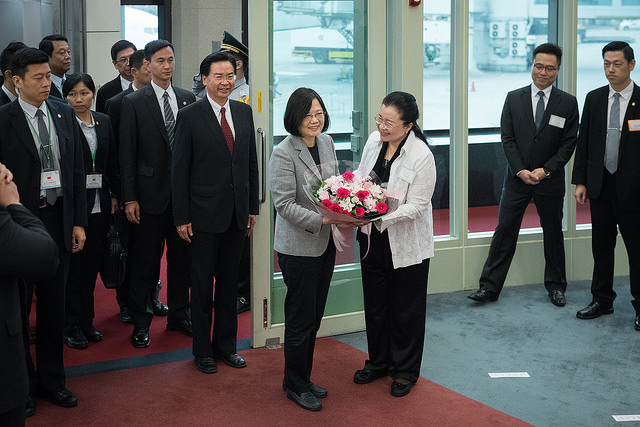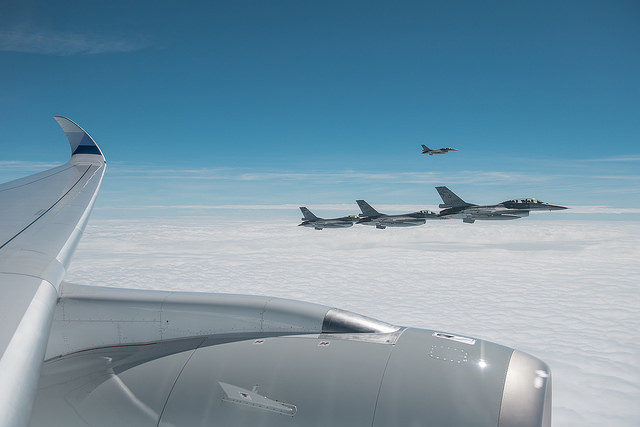News & activities
 News releases
News releases
President Tsai Ing-wen completed her visit to three of Taiwan's Pacific island allies and returned to Taiwan around noon on November 4. Upon arriving at Taiwan Taoyuan International Airport, the president delivered remarks about her trip, which was dubbed "Sustainable Austronesia, Working Together for a Better Future—2017 State Visits to Pacific Allies." Explaining the trip's achievements to the media, she stressed that where the national interest is at stake, partisan considerations must not come into play, and called on both the ruling and opposition camps to join hands and work together for a better Taiwan.
Presidential Office Spokesperson Lin He-ming (林鶴明) also stated that President Tsai was very thankful to the governments of the Marshall Islands, Tuvalu, and the Solomon Islands for their invitations. During her visits, she and her delegation received warm hospitality from the heads of state and ordinary citizens of all three countries, for which she was extremely grateful.
In addition, President Tsai once again thanked the US administration for facilitating transit stops for her delegation in Hawaii and Guam, based on the principles of safety, convenience, comfort, and dignity.
A translation of President Tsai's remarks follows:
My fellow countrymen, we've completed our overseas mission and returned home. First, I want to thank the members of my delegation, our support staff, and our friends in the media for all your hard work. I’m sure the opportunity to do your part for our nation's diplomacy has been a memorable experience.
Each of the three diplomatic allies that we visited on this trip—the Marshall Islands, Tuvalu, and the Solomon Islands—is an island nation that has been seriously affected by global climate change. These countries are small, but the challenges they face are enormous.
Before departing last week, we identified two key objectives for the trip. One was to demonstrate Taiwan's ability to contribute to the international community. The other was to express appreciation to all the expatriates, Taiwanese business people, and members of our technical missions for the hard work they do for our diplomatic allies. During this trip, we did indeed demonstrate the diverse power of our nation and enhance our substantive cooperation with our diplomatic allies, especially in the areas of agriculture, education, and healthcare.
At the same time, we were able to gain a deeper understanding of the work and the lives of the members of our local technical and medical missions. I want to thank all our colleagues who are out there working on the front lines. Because of you, the citizens of our diplomatic allies will always cherish their friendship with Taiwan.
We maintained a busy itinerary throughout this eight-day, seven-night journey, and achieved what we set out to do. In addition to thanking everyone on staff for your hard work, I must give credit to the long-term efforts of our civil servants, whose work in the field of diplomacy has built slowly and steadily toward this day regardless of the party in power, be it the Democratic Progressive Party (DPP) or the Kuomintang (KMT).
Cooperation across party lines and accumulating policy achievements are the key to keeping Taiwan moving forward. In a democratic country, competition is inevitable, but when our national interests are at stake, there can be no partisan divide, and we must persevere.
Yesterday was a good example. Premier William Lai (賴清德) of the DPP and former Vice President Wu Den-yih (吳敦義) of the KMT met, and Senior Advisor to the President James Soong (宋楚瑜), chairman of the People First Party, will soon be acting as my representative at the annual APEC Economic Leaders' Week. These examples show that in the name of national progress and our democratic values, we can cooperate and engage in dialogue.
When the ruling and opposition camps can cooperate, we can definitely make Taiwan better. I believe that our citizens expect that all political parties will show unity and continuous effort.
We've completed our overseas mission. But we still have lots to do, and we will keep working. Thank you!
Among those at the airport to welcome the president were National Security Council Secretary-General Yen Teh-fa (嚴德發), Deputy Secretary-General to the President Liu Chien-sin (劉建忻), National Security Bureau Director-General Peng Sheng-Chu (彭勝竹), Deputy Foreign Minister Wu Chih-Chung (吳志中), Deputy Minister of the Overseas Community Affairs Council Tien Chiu-Chin (田秋堇), Nicaraguan Ambassador to the ROC William Manuel Tapia Aleman (head of the foreign diplomatic corps in Taiwan), and a representative from the Marshall Islands.










